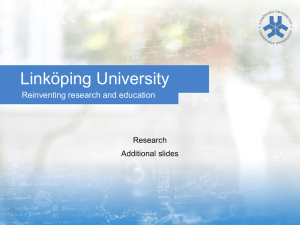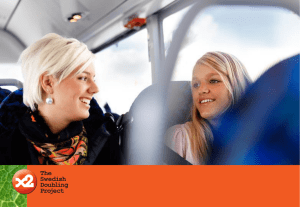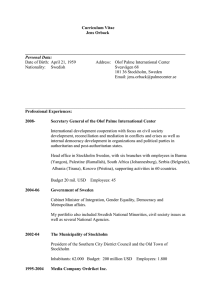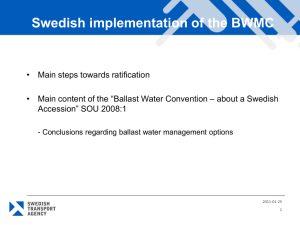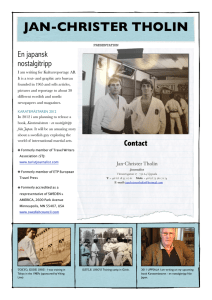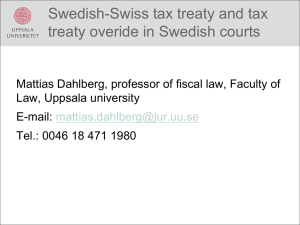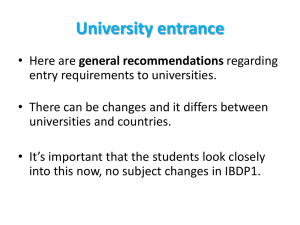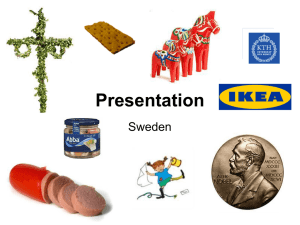The Swedish national system
advertisement
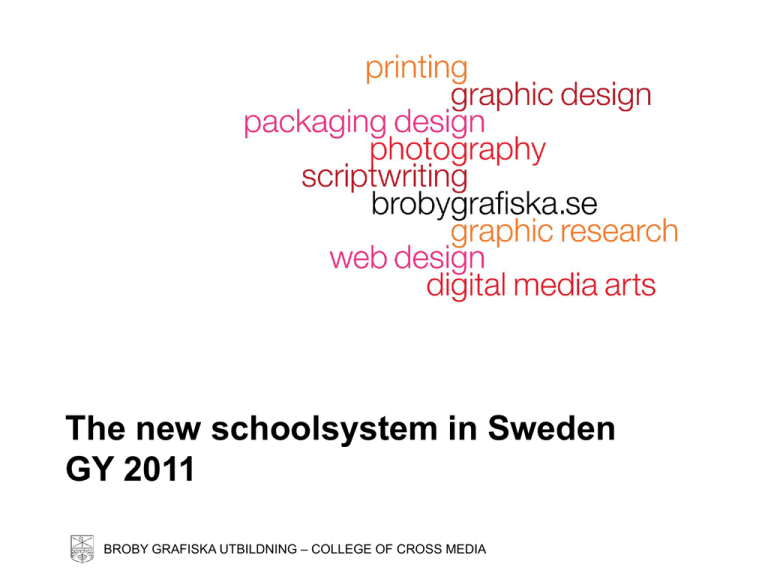
The new schoolsystem in Sweden GY 2011 BROBY GRAFISKA UTBILDNING – COLLEGE OF CROSS MEDIA The Swedish Education System 18 national programs or programs approved by The Swedish National Agency for Education – Twelve (12) Vocational programmes – Six (6) programmes for preparatory for higher education Before July 2011 – Seventeen (17) national programmes Two exams 1. Qualifications for higher education 2. Qualifications for different professions – Possibility to obtain Basic Qualifications for higher studies by studying a few extra courses Before July 2011 – Basic qualification for higher education Higher qualifications for Upper Secondary School Vocational programme – Swedish or Swedish 2 – English – Maths – At least five (5) more subjects Before July 2011: – Swedish/Swedish 2 – Math and – English Programme preparatory for higher education. – Swedish or Swedish 2 – English – Maths – At least nine (9) more subjects Before July 2011: – – – Swedish/Swedish 2 Math and English Programme structure – Examobjectives describe the programme and aim for the planning of the studies. – Field of study, In-Depth programme, professional outputs and possible varations will be linked to the exam objectives. – The Swedish National Agency for Education and the National Council for Industry drawn up proposals for the 12 vocational programs – More professional subjects – Exam goal for each programme as a red line through the whole programme – 200 plans with 800 courses Five Introduction programs (before July 2011: one 1. programme) Preparatory year – Possibility to have a quick jurisdiction – Programme-oriented individual choice – Preparation for a vocational programme 2. Introduction to a profession – Preparation for work or vocational programme 3. Individual option – Specialized for each individual 4. Language introduction – Preparation for immigrants New rating scale with more grades OLD system NEW system IG = 0 = not approved G =10 = approved VG = 15 =more than approved MVG = 20 = much more than approved F=0 not approved E = 10 approved. Criteria available D = 12,5 C = 15 more than approved. Criteria available B = 17,5 A = 20 much more than approved. Criteria available Swedish Education Act new July 1st 2011 – Education shall be adapted to each pupil´s preconditions and needs. – Availability of School Doctor and Nurse, Psychologist, Counselor and Study and Career help. – Availability of School Library – Higher possibility to appeal decisions – More possibilities to take diciplinary actions for Teachers and Head master, to prevent insecurity for students – In singel occasions the school can charge for activities – Head of school can delegate internal work to another employee – More strict sanction, from the Swedish National Agency of Education, to schools that don´t follow the rules Workplace-based learning (APL) 15 weeks during the 3 years – The school board has the responsability to acquire places – One week workplace = 23 teaching time – Head master decides over which courses has to be on the workplaces – Quality requirements of the workplace – Supervisor training mandatory – Local board with delegate from the industry, community, pupils and school representatives Apprenticeship education At least half of the teaching time being places at one or more workplaces – – – – It can begin the first, second or third year The school board has the responsability to acquire places One week workplace = 23 teaching time Head master decides over which courses has to be on the workplaces – Quality requirements of the workplace – Supervisor training mandatory – Local board with delegate from the industry, community, pupils and school representatives Enterprise in education – Enterprise in school is not only setting up and running a company. The Swedish school system call it Entrepreneurial learning which involves 'learning by doing'. – It is an educational approach Local council/Nationell council – Nationell work together with the Swedish National Agency for Education – Representatives from trade union, industries, authorities as employment agency – Good knowledge about Education and outcome – Local council work together the school – Representatives from local authorities as job center, the community, local industries – Develop Workplace learning – Assess and formulate the exam Industrial Engineering Programme (a vocational programme) Product and mechanical engineering – Machine operator or – Product work with design ( originalare) What is included in the programme? – Industrial technology an production – Practise dealing with equipment, material and processes – Work organisation, product economics – Quality assurance – How methods and technology affect society and environment Industrial Engineering Programme Programme organisation – General upper secondary subjects at Vocational prog. – English, History, Sports and Health, Maths, Natural Science, Religious Knowledge, Social Studies, Swedish or Swedish as a Secondary language. – Before July 2011: English, Estetics, Sports and Health, Math, Natural Science, Social Studies, Swedish/Swedish 2 and religious. – General programme subjects – Industrial processes, Human being in industry, Production and Production equipment – In-Depth Programme – Ability to further specialise and broaden the knowledge. Industrial Engineering Programme – Project – At the end of the programme a project within the job field – Learning through work placement – At least15 weeks APL (Workplace Learning) – Apprenticeships – Same level of knowledge is gained but at least half of the time at workplaces Summary for changes to a new school system – Students subjects knowledge is poorer than reported 1992 and 1995 – The result is tougher requirements and higher standards in the Upper Secondary School – Higher requirements for starting studies at all programmes – Higher requirements in courses related to before – Eg Maths – Qualifications requirements in 2015, certification is obligate – Clearer outcome specific professions or qualification for higher studies – More inspections from the Agency – Disciplinary actions possible for teachers
